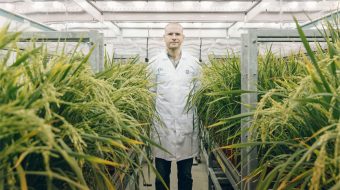One of the most advanced plant growth facilities in the world, which is helping scientists to enhance our understanding of how crops are being affected by climate change and disease, is set to become more sustainable thanks to new funding.

The Sir David Read Controlled Environment Facility in the University of Sheffield’s Department of Animal and Plant Sciences enables researchers to grow crops in environments that are similar to the majority of climate conditions found across the globe.
From the tropics to the polar regions, the facility allows scientists to recreate climate conditions from the past, as well as simulate environmental conditions from a world that has been significantly affected by climate change.
The facility is being used by Sheffield scientists as part of crucial research into food security.
As a result of the new funding, scientists from the University are set to modernise the facility and significantly reduce its energy expenditure in order to reduce its carbon footprint.
Awarded by the Salix Energy Efficiency Scheme, the £829,000 funding will be used to replace the existing plant growth lighting with state-of-the-art LED lighting which, as well as requiring much less energy, will also provide a range of research benefits.
The enhanced lighting will give a spectral composition as close as possible to that of natural sunlight and provide the ability to mimic sunrise and sunset conditions.
Timo Blake, Controlled Environment Facilities Manager in the University’s Department of Animal and Plant Sciences, said: “As well as saving a huge amount of energy, this upgrade will give researchers here at Sheffield access to some of the best controlled plant growth facilities in the world.
“Researchers using the facilities will be able to accurately track weather conditions from different parts of the planet, along with the ability to use climate data from historical and modelled weather systems too.”
The Sir David Read Controlled Environment Facility opened in 2004 after the culmination of a £10.4 million investment by the Joint Infrastructure Fund.
This was followed by a more recent infrastructure investment of £3.6 million in 2016-17 as part of the launch of the University’s Plant Production and Protection (P3) translational biology centre, which is working to solve some of the biggest problems in the global food and agriculture industries.
Sheffield’s P3 scientists are developing innovative ways of identifying sustainable and efficient food sources, spanning topics from the genome to the Earth’s atmosphere.
Professor Duncan Cameron, Co-Director of the P3 Plant Production and Protection centre at the University, said: “This significant investment not only enhances our already state of the art facilities, it importantly aligns our research with the University’s developing sustainability strategy, supporting the University’s community in dramatically reducing the environmental impact of our teaching and research.”
He added: “The investment from the Salix fund will allow us to make significant reductions in our carbon footprint, meaning our world-leading research into environmentally sustainable futures will become even more sustainable.”
The University’s Department of Animal and Plant Sciences is home to one of the biggest communities of whole-organism biologists in the UK. Its research covers animals, plants, humans, microbes, evolution and ecosystems, in habitats ranging from the polar regions to the tropics. This work aims to shed new light on the fundamental processes that drive biological systems and help solve pressing environmental problems.
Source: University of Sheffield



